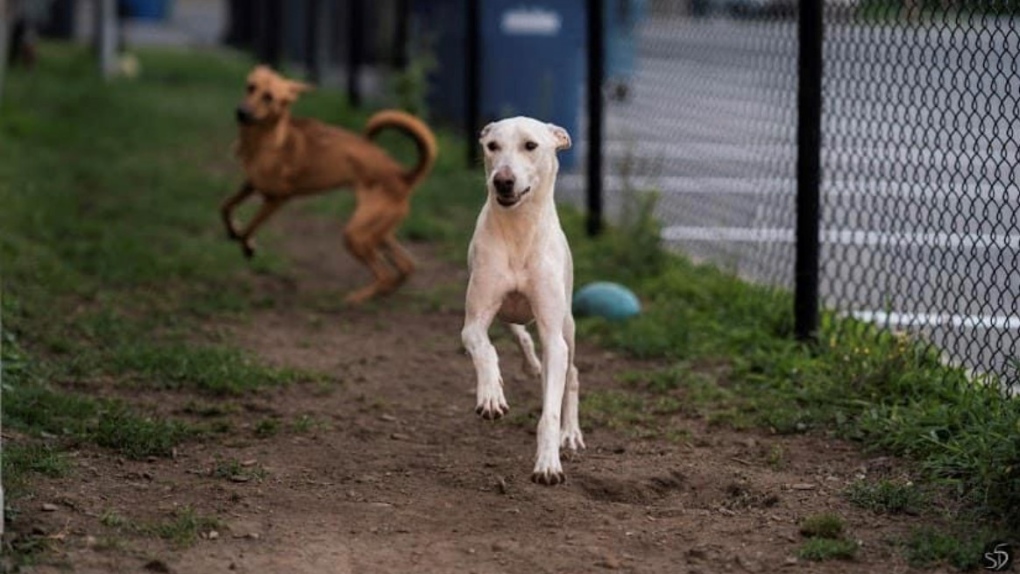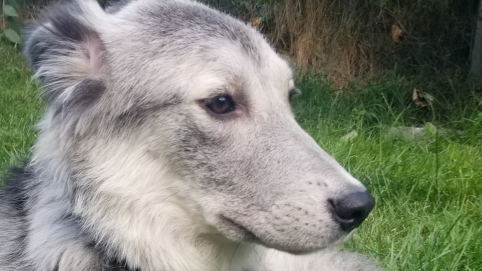'A very bad idea': Pet rescues condemn Canada's upcoming ban on foreign dogs from over 100 countries
Quebec dog rescue Refuge Magoo is accustomed to bringing in dogs from overseas, but not quite at this pace.
"Right now we have about 40 dogs, could be 45," said staff coordinator Valerie Tetreault, speaking to CTV News in late August. "We just had 11 come in this week."
The goal is to bring in as many foreign dogs as possible before Canada's ban kicks in at the end of the month.
As of Sept. 28, Canada will prohibit the import of dogs from over 100 countries spanning parts of Africa, Asia, South America, the Caribbean, the Middle East and Eastern Europe.
The reason? To prevent the spread of dog rabies.
The measure, announced by the Canadian Food Inspection Agency (CFIA) in June, was developed after two infected dogs were imported into the country from Iran in 2021.
A different strain from that found in wild animals such as raccoons, bats, skunks and foxes, dog rabies is a viral disease that attacks the nervous system.
The CFIA notes that, although there are currently no confirmed cases of dog rabies in Canada, the fatality rate for infected humans is over 99 per cent if treatment arrives too late.
"The importation of even one rabid dog could result in transmission to humans, pets, and wildlife. If a person is exposed, they need to undergo serious treatment," reads a CFIA statement sent to CTV News.
But advocates say the rule is too extreme and could have devastating consequences for dogs and rescuers alike.
RESCUES AT RISK?
For Refuge Magoo, based out of Vaudreuil-Dorion, the import of foreign pups is crucial.
About 90 per cent of the rescue's dogs come from other countries. Of those, roughly half are from Mexico (exempt from the ban), while the other half come from Kuwait (considered "high risk" for dog rabies, i.e. not exempt).
"Most rescues won't survive without these import dogs," Tetreault said.
"We will take a [local] surrender without a question," Tetrault explained. "But we do not see dogs roaming the streets [in Canada], tired, injured, hungry, starving, on the verge of death."
By bringing in animals from countries where street dogs in this condition are common, rescues can provide options for Quebecers interested in adopting their canine companion instead of shopping for one, Tetrault explained.
"There's such a high demand for these adoption dogs," she added. "[If] we're not bringing them in and there's a shortage of adoptable dogs. Where do we think people are gonna go?"
The answer, she fears, is the puppy mill.
"Those dogs are mistreated, abused. We don't want that industry to flourish. We want to save the dogs that we can already."
 Livvy (left) and Milo (right) were brought into Quebec from Kuwait. (sd5photography / Shawn Dos Santos)
Livvy (left) and Milo (right) were brought into Quebec from Kuwait. (sd5photography / Shawn Dos Santos)
'THEY DON'T HAVE A CHANCE'
But not all rescuers agree with this assessment.
Sophie Fournier is the woman behind Sophie's Dog Adoption, a small-scale adoption operation near Montreal.
She argues that local dog surrenders are a major issue; even if some foreign dogs are off limits, there are enough abandoned pups in Quebec to go around.
Nevertheless, Fournier is firmly against the ban.
"I think that's a very bad idea, the way they're going about it," she said.
Although many of Fournier's dogs are locally sourced, a connection in Lebanon -- a country considered "high risk for dog rabies" by the CFIA -- frequently ships dogs her way.
If these dogs can't make it out of Lebanon, said Fournier, "they don't have a chance."
She said overseas rescues accustomed to collaborating with Canadian adoption groups are now scrambling to find these dogs a home, many of whom are in rough shape after years of living on the streets.
"It's freaking everybody out [...] Everyone is rushing to ship dogs," she said.
She fears the urgency will lead to cutting corners, which comes with safety risks -- the very risks the CFIA is trying to mitigate.
"It's becoming a total mess. I find it's becoming chaotic."
 Windy was brought into Quebec from Beirut, Lebanon. (Sophie's Dog Adoption)
Windy was brought into Quebec from Beirut, Lebanon. (Sophie's Dog Adoption)
EXPLORING ALTERNATIVES
Both Refuge Magoo and Sophie's Dog Adoption have a thorough vetting process when it comes to foreign dogs.
"With vaccines and treatments and appropriate care, rabies is preventable," Tetrault said.
Before their dogs enter Canada, the organizations obtain a vet-signed health certificate, including proof of rabies vaccination, as required by federal law.
Their dogs are also spayed, neutered and microchipped before flying to their new home.
Fournier says a close eye is kept on the dogs once they're brought in.
"If I see anything wrong with their health then I will take them to the vet," she explained.
With these precautions in mind, the rescuers question why a ban is necessary and say other alternatives should be explored first, such as a mandatory quarantine period.
"Could they have done things differently? And put maybe tighter restraints for people from rescues bringing in dogs? Absolutely," Tetrault said.
But the CFIA says vaccines aren't always effective.
"The rabies vaccine is unlikely to be protective if it is administered after an animal has already been infected. Because rabies can have a long incubation period, a dog may be unknowingly imported with the disease, even if it was vaccinated prior to importation," its statement reads.
The risk is just too high, it argues, and a ban is the only option.
"The CFIA has developed an approach that is relevant and proportionate to the current public health risks to animals and people, and takes into account aspects such as the CFIA's regulatory framework and infrastructure, including quarantine facilities at points of entry."
But rescues are pleading for a chance to try something different.
"Watch us all rise to the occasion," Tetrault implored. "[We] have no issue with going the extra steps to ensure everybody's safety."
CTVNews.ca Top Stories

Donald Trump says Canada becoming 51st U.S. state 'a great idea'
U.S. President-elect Donald Trump is taking aim at Canada once more, saying it would be 'a great idea' to make it America's ‘51st state.'
'You're either with Beijing or you're with Washington': Ford says to Mexico in CNN interview
Ontario Premier Doug Ford has a message for Mexico as the threat of tariffs by incoming president Donald Trump hangs over both sides of the U.S. border.
There are 88 new Order of Canada appointees. Here's a look at some of the most notable names
Ryan Reynolds, Scott Oake and Maureen Ann Jennings are among the 88 new recipients of the Order of Canada.
After scamming their victims, some con artists go on to scam our courts with impunity
Convicts, including fraudsters, are skipping out on their court-ordered payments to their victims to the tune of tens of millions of dollars across the country, according to figures obtained by CTV W5.
Synagogue on Montreal's West Island targeted by alleged arson
A synagogue on Montreal's West Island was the target of an alleged arson attack.
Canadians return to Canada Post with relief -- and shakier faith in the service
Canada Post trucks, conveyors and mail carriers swung back into motion Tuesday after a month-long strike by more than 55,000 postal workers left letters and parcels in limbo and a massive backlog to sort through.
NEW These seniors were hit by the affordability crisis in a different way. They're having to support their children and grandchildren
With the high cost of living increasingly a concern, some seniors are making sacrifices to help their adult children and grandchildren make ends meet. Here are some of their stories.
Restaurants that charge tax during holiday break could get investigated by CRA: industry expert
Restaurants that fail to honour the holiday tax break could be investigated by the Canada Revenue Tax Agency, according to the Ontario Restaurant Hotel and Motel Association.
Quebec man pleads guilty to spreading hate speech about Jews, trying to make 3D-printed guns
A Quebec man has pleaded guilty to attempting to manufacture multiple firearms with a 3D printer, including an AR-15, and spreading hate speech about the Jewish community.


































